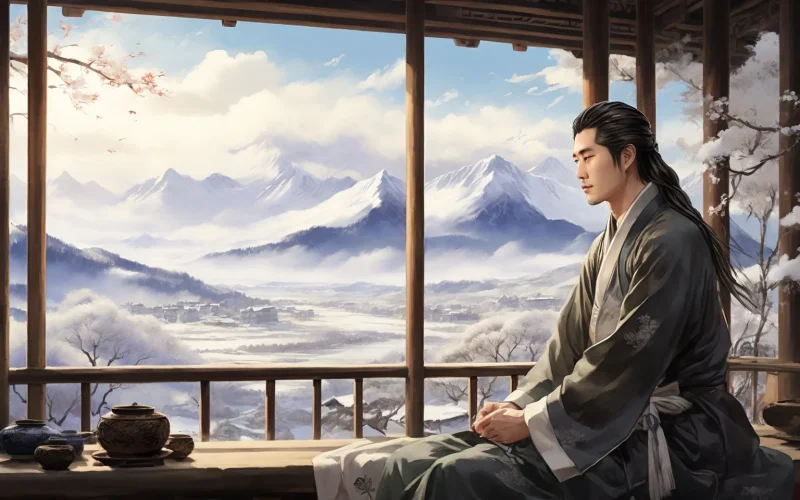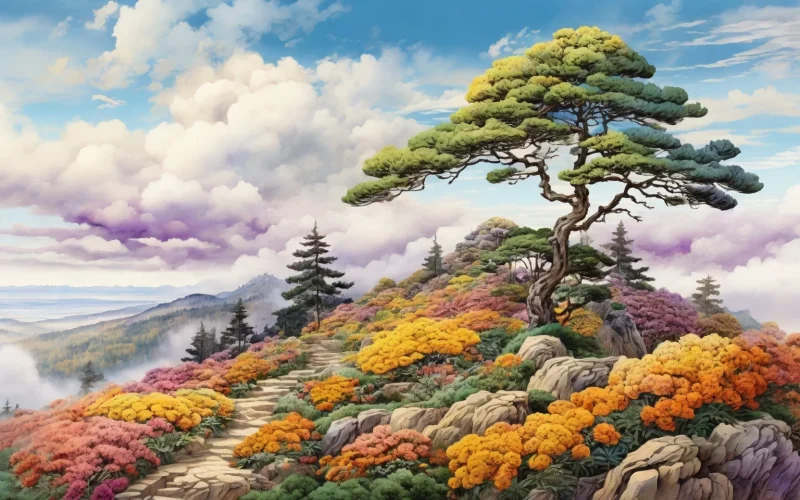I’ve hidden in thatched cot secluded trace
From social life I stay far, far away.
Left and right I find no familiar face;
My wicket gate is closed e’en at midday.
The dreary wind mourns the end of the year;
From dawn till dusk falls a skyful of snow.
I listen but no sound reaches my ear;
I gaze but see dazzling light high and low.
Chilly air invades my collar and sleeves;
My table’s often bare of drink and food.
In empty rooms only solitude grieves.
What’s there to please?
Can there be nothing good?
I can peruse but books of olden days,
In which I find deeds worthy of memory.
I cannot climb the old time-honored ways,
Though wrongly praised for honest poverty.
If I can’t follow the broad common road,
Is it bad a rural life to renew?
I tell you I will not leave my abode,
Who can understand me better than you?
Original Poem
「癸卯岁十二月中作与从弟敬远」
陶渊明
寝迹衡门下,邈与世相绝。
顾盼莫谁知,荆扉昼常闭。
凄凄岁暮风,翳翳经日雪。
倾耳无希声,在目皓已洁。
劲气侵襟袖,箪瓢谢屡设。
萧索空宇中,了无一可悦。
历览千载书,时时见遗烈。
高操非所攀,谬得固穷节。
平津苟不由,栖迟讵为拙!
寄意一言外,兹契谁能别?
Interpretation
Composed during Tao Yuanming's mourning period at age 39, this poem emerges from political turmoil as Huan Xuan usurped the Jin throne, imprisoning Emperor An in Xunyang (Tao's hometown). Disillusioned with officialdom amid societal chaos, Tao turns toward reclusive transcendence. Though addressed to his cousin, the work ultimately voices his own resolve to preserve spiritual freedom amidst adversity.
First Couplet: "寝迹衡门下,邈与世相绝。"
Qǐn jī héng mén xià, miǎo yǔ shì xiāng jué.
Dwelling beneath a crude wooden gate - remotely severed from the world.
The opening establishes reclusive circumstances, with "remotely" suggesting involuntary detachment under political pressures.
Second Couplet: "顾盼莫谁知,荆扉昼常闭。"
Gù pàn mò shéi zhī, jīng fēi zhòu cháng bì.
Looking around - none know me; thornwood door stays shut by day.
Portrays the isolation of reclusion, emphasizing the poet's sense of being forgotten.
Third Couplet: "凄凄岁暮风,翳翳经日雪。"
Qī qī suì mù fēng, yì yì jīng rì xuě.
Year's-end winds wail bitterly; snow veils the sun all day.
Deepens the wintry atmosphere, casting a solemn pall over the scene.
Fourth Couplet: "倾耳无希声,在目皓已洁。"
Qīng ěr wú xī shēng, zài mù hào yǐ jié.
Listening - no human sounds; gazing - pure whiteness everywhere.
Contrasts auditory absence with visual purity, mirroring the poet's mental clarity amid physical solitude.
Fifth Couplet: "劲气侵襟袖,箪瓢谢屡设。"
Jìn qì qīn jīn xiù, dān piáo xiè lǚ shè.
Biting air penetrates sleeves; simple meals become routine.
Despite material hardship, the poet maintains dignified composure.
Sixth Couplet: "萧索空宇中,了无一可悦。"
Xiāo suǒ kōng yǔ zhōng, liǎo wú yī kě yuè.
Desolate empty rooms - nothing brings delight.
Candidly acknowledges the joylessness of impoverished seclusion.
Seventh Couplet: "历览千载书,时时见遗烈。"
Lì lǎn qiān zǎi shū, shí shí jiàn yí liè.
Reading millennia of texts, I often encounter noble exemplars.
Finds spiritual sustenance in ancient sages' recorded virtues.
Eighth Couplet: "高操非所攀,谬得固穷节。"
Gāo cāo fēi suǒ pān, miù dé gù qióng jié.
Their lofty integrity surpasses me; I merely keep my humble constancy.
Modestly claims only basic steadfastness compared to historical paragons.
Ninth Couplet: "平津苟不由,栖迟讵为拙!"
Píng jīn gǒu bù yóu, qī chí jù wéi zhuō!
If the straight path proves impassable, how could dwelling in obscurity be folly?
Defends reclusion as wisdom when ethical officialdom proves impossible.
Tenth Couplet: "寄意一言外,兹契谁能别?"
Jì yì yī yán wài, zī qì shéi néng bié?
Meaning resides beyond words - who truly understands this bond?
Concludes with profound subtlety, questioning whether any can comprehend his unspoken resolve.
Holistic Appreciation
This winter meditation blends scene, emotion and moral conviction. Tao Yuanming paints his reclusive hardship with stark honesty - the crude dwelling, bitter cold, and spiritual isolation ("nothing brings delight"). Yet through classical texts, he connects with ancient exemplars, transforming material deprivation into spiritual fortitude. The poem's power lies in its unreserved depiction of reclusion's austerity while affirming unshakable ethical commitment. The final rhetorical question underscores the lonely nobility of his chosen path.
Artistic Merits
- Psychological authenticity: Unflinchingly documents reclusive hardship
- Historical consciousness: Draws strength from textual communion with past sages
- Ethical clarity: Articulates principled withdrawal as moral choice
- Linguistic restraint: Conveys profound ideas through economical expression
Insights
The poem demonstrates how ethical survival sometimes requires physical withdrawal. Tao's example teaches that integrity may demand isolation when society becomes corrupt, and that spiritual freedom can flourish amidst material deprivation. His "humble constancy" offers an alternative to worldly success - proving that true dignity resides not in external recognition but in unwavering commitment to principle, even when understood by few. This message resonates powerfully in any era where individuals face conflicts between conscience and convention.
Poem translator
Xu Yuanchong (许渊冲)
About the poet

Tao Yuanming(陶渊明), 365 – 427 CE, was a poet, literary figure, fu writer, and essayist active during the late Eastern Jin and early Liu Song dynasties. Born in Chaisang (near present-day Jiujiang, Jiangxi Province), he pioneered a new genre of pastoral-themed literature, expressing profound philosophical insights through simple language. His poetic style became an enduring aesthetic standard in classical Chinese poetry.












